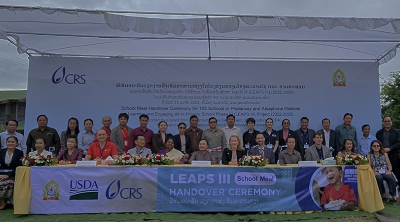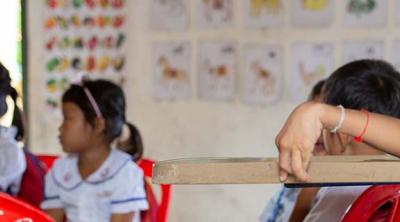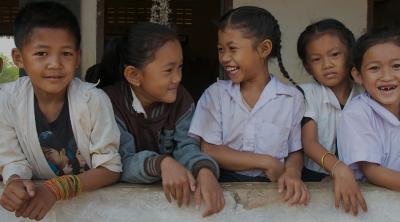CRS in Laos
Laos, a small landlocked country of seven million people, lacks adequate education, health services, and infrastructure. This has made it difficult for the country to fully support the development of its people. Since 2007, Catholic Relief Services has been working in Laos in partnership with the local government to ensure that all children have access to quality education, improved nutrition and increased COVID-19 and routine vaccination coverage.
School Meals
CRS Lao PDR has been working to improve school meals in Laos since 2012 through the McGovern-Dole Food for Education-funded project. This initiative, funded by the United States Department of Agriculture (USDA) and in partnership with the Ministry of Education and Sports, takes a holistic comprehensive approach to school meals, nutrition, literacy, WASH (water, sanitation, and hygiene) activities, and school governance. By incorporating school-based management and supporting local education system strengthening, CRS aims to improve access to education and nutrition for marginalized students.
To achieve this, CRS has designed a conceptual framework based on the World Bank Group's Systems Approach for Better Education Results (SABER) platform, which incorporates elements from other systems strengthening models. The organization aims to ensure that communities and MOES have the necessary inputs, such as food and capacity, to continue providing school meals. This includes providing donated commodities for USDA and supporting the transition to local commodities through linkages from schools to local farmers. CRS also supports cooks in schools to improve the quality and safety of meals and provides training on nutrition and hygiene practices.
CRS has been working closely with the Ministry of Education and Sports and the World Food Program (WFP) to transition school feeding programs to MOES management through the National School Meals Program (NSMP) in Lao PDR. CRS has been providing technical input, training, coaching, and accompaniment to schools on management of commodities, procurement of local food, transition to the cash system under the NSMP, village education development committees management and leadership, and school meals policies at the provincial, district, and village levels. CRS has also been facilitating community and government support of the program by working within government structures to align the necessary support and create linkages between the MOES, the Ministry of Health, and the Ministry of Agriculture and Forestry. Additionally, CRS is providing ongoing technical assistance post-handover on monitoring requirements to ensure proper implementation of the national school meals program.
By taking a comprehensive approach to school meals, CRS helps the most marginalized students improve their access to education and nutrition in alignment with the priorities of the government Education and Sports Sector Development Plan 2021-2025.
EDUCATION
CRS has implemented various educational initiatives in Lao PDR aimed at improving literacy outcomes and promoting inclusive education.
Working closely with the Lao government, CRS has improved formative assessment and remediation activities, primary teachers' skills, and effective teaching strategies, resulting in better learning outcomes for students. CRS projects focus on capacity building and system-strengthening activities at the local, district, provincial, and national levels, positively impacting students' attendance, enrollment, learning, and health, leading to sustainable graduation. Additionally, CRS works with Teacher Learning Circles to provide ongoing professional support throughout the school year.
In sustaining child-based school readiness, CRS focuses on two pathways. First, CRS supports children as they transition from pre-primary programming into early primary. Second, CRS works with MOES and UNICEF on a sustainability model to integrate school readiness and implement it as a low-cost alternative to formal early childhood education in areas without a pre-primary block.
CRS provides learning materials, including storybooks, alphabet cards, and writing materials, through Corner Libraries and Take-Home Learning Materials, with age-appropriate and literacy-level books and disability-inclusive materials. Recently, CRS has been promoting the utilization of digital applications for literacy acquisition and access to digital assets, aligning the programs with national standards, and influencing policy and development plans to ensure their interventions are sustainable and contribute to the overall educational goals of the country.
CRS has collaborated with the government of Laos, the Association for Autism, the University of Oregon, and other partners for more than a decade to promote inclusive education. These initiatives have involved training and supporting Village Education Development Committees to create community awareness events, implement community-based inclusive practices, and facilitate inclusive schooling. CRS has supported advocating inclusive policies and plans, building capacity to raise awareness and promote inclusive education, and training teachers, administrators, and parents in inclusive education strategies and tools. Additionally, CRS provided guidance to students to establish a "circle of friends" for those who require additional assistance and support in the classroom.
Furthermore, CRS is working to improve the quality of higher education in Lao PDR by partnering with local universities to provide technical assistance and training to faculty members and students in curriculum development, research methods, and teaching methodologies. CRS also works to strengthen the universities' capacity to manage and administer research grants and develop partnerships with international universities and research institutions. One of CRS's key initiatives is the Applied Nutritional Research Capacity Building Laos activity, which is funded by USAID.
Overall, CRS's efforts in Laos aim to improve learning outcomes, support inclusive education practices, improve access to education, and strengthen the curriculum and capabilities in higher education.
HEALTH and NUTRITION
For many years, CRS has been working on improving the health and nutrition of marginalized populations. In Lao PDR, CRS has been addressing the issue of malnutrition, which is a significant challenge in the country, particularly among children under the age of five. One of CRS's current key initiatives in Lao PDR is the Applied Nutritional Research Capacity Building Laos activity. This initiative aims to set up an institute with the resources to conduct innovative, context-appropriate research in nutrition and bring in United States, scientists, researchers, universities, and institutions to help develop a cadre of Lao research professionals on nutrition, including providing opportunities for Lao researchers to receive small research grants and training workshops.
Moreover, CRS has been improving the nutritional status of vulnerable populations in Lao PDR through its nutrition programs. These programs focus on improving access to nutritious food through school meals, promoting healthy behaviors, and providing education and training to communities on the importance of good nutrition. CRS has extensive experience in delivering water, sanitation, and hygiene (WASH) activities in Lao PDR, particularly in schools. This includes the construction of water sources with solar pumps, handwashing stations, and hygiene promotion activities. Additionally, CRS leads community mobilization activities, such as engaging with WASH Ambassadors, providing food preparation training, and establishing school gardens, to reduce the spread of diseases and build climate resilience in schools.
CRS has also been working to improve the capacity of health workers and health community volunteers to strengthen nutrition and health services, particularly maternal and child health services, to vulnerable populations. Through its training programs, CRS has been providing health workers and volunteers with the knowledge and skills they need to identify and treat malnutrition and to promote healthy behaviors in their communities.
Recently, CRS has received funding under the Australian Humanitarian Partnership to support the Ministry of Health's efforts to increase COVID-19 and routine vaccination coverage in the vulnerable target district. CRS is supporting addressing barriers to access, such as mobility challenges, transportation expenses, and a lack of outreach services, improving risk communication and community engagement, and prioritizing gender and disability inclusion to ensure equal access to the vaccine.
Recent programs:
-
Learning and Engaging All in Primary Schools (LEAPS III); USDA; 2021-2026
-
School Meal Project (SLP); WFP and USDA; 2020-2025
-
Applied Nutrition Research Capacity Building (ANRCB); Purdue University and USAID; 2020-2026
-
Increase the coverage rate, and access to the covid-19 vaccination and routine vaccination through community engagement; Oxfam and DFAT; 2021-2023
-
Fit for School; GIZ; 2021
-
Child Literacy Development Project; CRS; 2017-2018
-
Sight, Sound, and Mobility for Inclusive Education; CRS; 2012-2017
-
Right to Learn Project (Laos disability inclusive Education); DFAT; 2010-2015
Key Government partners:
Ministry of Education and Sport, Ministry of Health, Ministry of Foreign Affairs, Ministry of Labor and Social Welfare, Ministry of Agriculture and Forestry, Centre of Nutrition, University of Health Sciences Laos, Lao Tropical and Public Health Institute (LaoTPH), National University of Lao PDR (NUOL), Lao Youth Union, Lao Women Union, Research Institute for Educational Science (RIES)
Other Key Partners:
Caritas Lao PDR, Caritas Luxemburg, Caritas Australia, USAID, USDA, WFP, European Union, UNICEF, DFAT, Lao Disabled People’s Association (LDPA), Association for Autism (AFA), UNDP, Save the Children, Purdue University, Indiana University, GIZ, Community Health and Inclusion Association (CHIAs), Association of People Living with HIV/AIDS (APL+), Association for Rural Mobilization and Improvement (ARMI), ABC International Development (ABCID), Training on Attitude Knowledge Skill and Action Center (TAKSA), SUN-CSA, Lao Red Cross, America Institute for Research, Oxfam, BEQUAL, WHO, Villanova University, Global Green Growth Institute (GGGI), World Bank
More About Our Work in Laos
| School Lunch Project | Learning and engaging | Capacity Building | School Meals |
 |
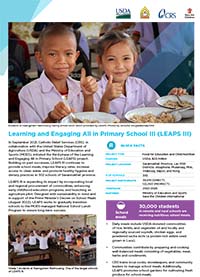 |
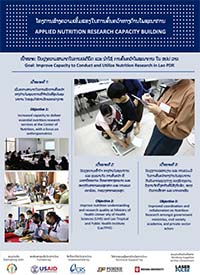 |
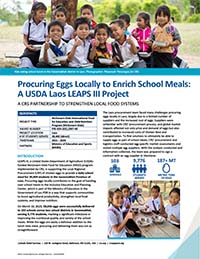 |
| COVID-19 Vaccination |
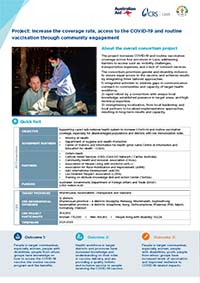 |
Stats
People served: over 500,000
Population: 7,529,475
Size: 91,430 sq mi; slightly larger than Utah
Our Partners
Become a Partner ›CRS' History in Laos
CRS began working in Laos in 1994 as an outreach program run from the Vietnam office and became an independent office in 2007. Education has been the primary focus of CRS’ commitment to development in Laos. CRS has focused on three main types of education programming: school feeding, inclusive education, and literacy development.
In 2013, CRS was awarded a US Department of Agriculture McGovern-Dole Food for Education project, Learning and Engaging all in Primary School, in which CRS provided over 16 million free school meals to primary school children in 310 schools in the Savannakhet Province.
In September 2016, CRS was awarded a follow-on five-year McGovern-Dole Food for Education project. CRS works in 350 schools and provides assistance in four main programming areas: school meals, Water, Sanitation, and Hygiene promotion, literacy, and inclusive education.
In September 2021, CRS in collaboration with the United States Department of Agriculture (USDA) and the Ministry of Education and Sports (MOES), initiated the third phase of the Learning and Engaging All in Primary School (LEAPS) project. Building on past successes, LEAPS III continues to provide school meals, improve literacy rates, increase access to clean water, and promote healthy hygiene and dietary practices in 302 schools of Savannakhet province.

